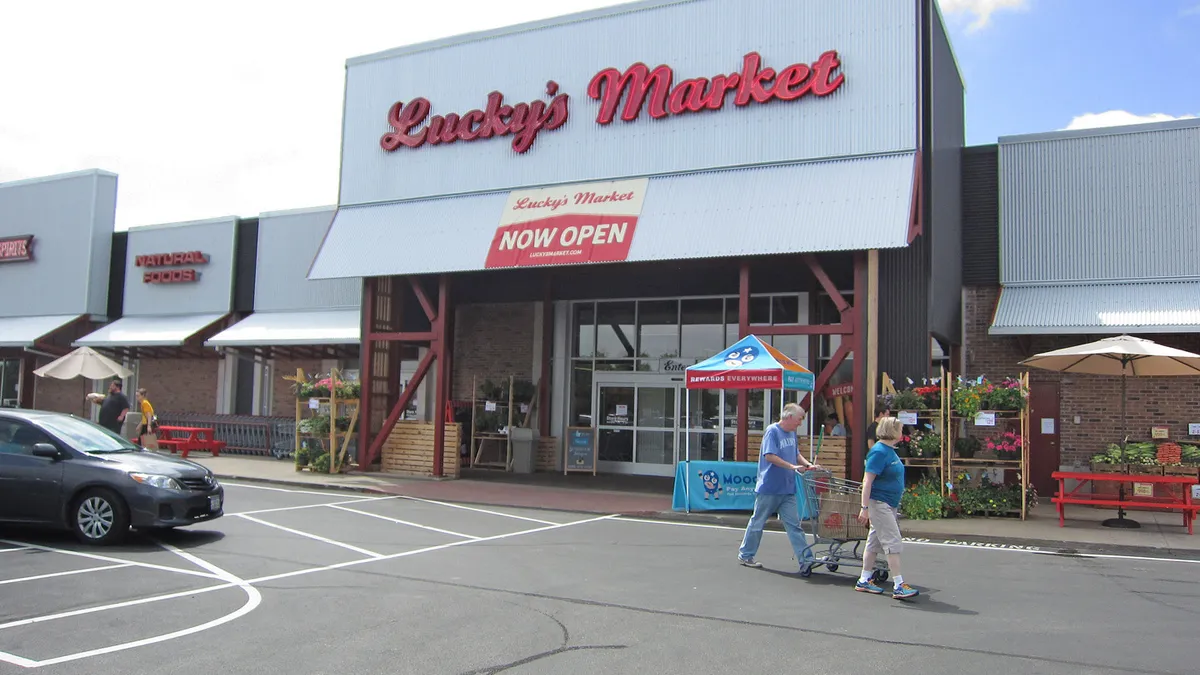Dive Brief:
- Lucky’s Market will open eight new stores in the Orlando area by the end of next year, according to a company release.
- The discount natural and organic grocer currently has one Orlando location. During the plast year and a half, it has opened eight stores throughout Florida. By summer 2019, the company estimates it will have 22 locations in the state.
- Lucky’s in-store offerings include a wide selection of local products, bulk foods, ready-to-eat meals, beer and wine, and a butcher shop featuring meats free from antibiotics and hormones. The retailer also offers a “Sip and Stroll” program that offers customers a $2 pint of beer or a $3 glass of wine while they shop.
Dive Insight:
Competition in Florida is heating up these days with Aldi, Sprouts Farmers Market and a surging Walmart joining Lucky’s in a push into promising markets throughout the state. Discount natural and organic grocers are especially finding a hotbed of demand in cities like Orlando, Tampa Bay and St. Petersburg. Although they only command a small market share in these areas, these grocers offer something new to consumers throughout the state and are rapidly growing their sales.
Florida has historically weak grocery competitors. Some, like Food Lion and Sweetbay, have exited the scene. Others, like Winn-Dixie, are still in business. But the Sunshine State has a dominant legacy grocer in Publix, which operates more than 800 stores throughout the state and enjoys fierce loyalty among consumers. A savvy operator that excels at service and execution, Publix also has a robust presence in natural and organic products, including its standalone Greenwise stores, which the company plans to expand for the first time in more than a decade.
Discount natural and organic chains have an attractive price advantage over the likes of Publix and Whole Foods, and have grown rapidly nationwide over the past few years. Sprouts, which went public four years ago, has expanded across the southwest U.S. and is now fanning out along the East Coast. Lucky’s, meanwhile, has grown quickly following a strategic investment in the business by Kroger back in 2014. Like mainstream chains, these grocers are capturing consumers that have defected from pricey natural and organic retailers like Whole Foods and The Fresh Market.
Lucky’s model is an interesting one. Its stores are spread out across 11 states, mostly in the Midwest, and often in college towns and second-tier cities that have low operating costs and a high density of millennials. Appealing to young consumers is a core part of Lucky’s strategy, and to that end the company offers a wide selection of locally sourced and foodie-friendly products. The company also tries to provide a fun shopping experience, with its beer and wine policy and frequent store events and sampling stations.
Lucky’s will need younger consumers to come out in force if it hopes to grow its market share in Florida. In Orlando, the company’s odds are looking pretty good. According to a recent study by Realtor.com, the city has the second highest percentage of millennials in the country.









